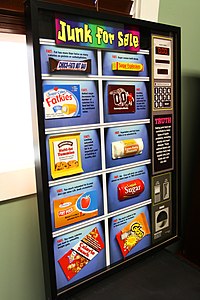
Photo from wikipedia
Background. Despite expert recommendations, most toddlers consume sugary drinks and more sweet and salty snack foods than fruits and vegetables as snacks. Studies have examined toddler caregivers’ reasons for providing… Click to show full abstract
Background. Despite expert recommendations, most toddlers consume sugary drinks and more sweet and salty snack foods than fruits and vegetables as snacks. Studies have examined toddler caregivers’ reasons for providing sugary drinks, but few have examined the reasons for providing nutritionally poor snack foods. Methods. Researchers conducted focus groups in one low-income community to assess caregivers’ familiarity, understanding and attitudes regarding healthy drink and snack recommendations for toddlers. A convenience sample of 24 caregivers of toddlers (12–36 months) participated. Researchers conducted a descriptive analysis of the participants’ familiarity with recommendations and a thematic analysis of the barriers to adherence. Results. Most participants were familiar with recommendations, but many were surprised that some drinks and snack foods are not recommended, and most believed recommendations were not realistic. Common barriers to adhering to recommendations included beliefs about their child’s innate preferences, family modeling and others’ provision of drinks and snacks in and outside the home. Practical barriers included the higher cost and inconvenience of serving fruits and vegetables on-the-go. Conclusion. Similar barriers limited caregivers’ adherence to expert recommendations about healthy snacks and drinks for toddlers. Nutrition education interventions should provide practical strategies for addressing these barriers and enlist childcare and health providers to reinforce recommendations.
Journal Title: Nutrients
Year Published: 2023
Link to full text (if available)
Share on Social Media: Sign Up to like & get
recommendations!